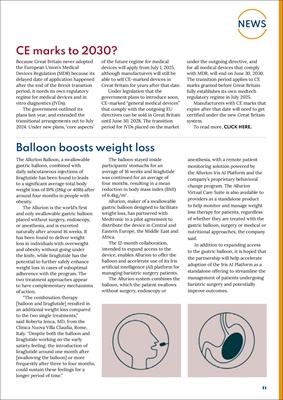
11
NEWS
CE marks to 2030?
Because Great Britain never adopted
the European Union's Medical
Devices Regulation (MDR) because its
delayed date of application happened
after the end of the Brexit transition
period, it needs its own regulatory
regime for medical devices and in
vitro diagnostics (IVDs).
The government outlined its
plans last year, and extended the
transitional arrangements out to July
2024. Under new plans, 'core aspects'
of the future regime for medical
devices will apply from July 1, 2025,
although manufacturers will still be
able to sell CE-marked devices in
Great Britain for years after that date.
Under legislation that the
government plans to introduce soon,
CE-marked "general medical devices"
that comply with the outgoing EU
directives can be sold in Great Britain
until June 30, 2028. The transition
period for IVDs placed on the market
under the outgoing directive, and
for all medical devices that comply
with MDR, will end on June 30, 2030.
The transition period applies to CE
marks granted before Great Britain
fully establishes its own medtech
regulatory regime in July 2025.
Manufacturers with CE marks that
expire after that date will need to get
certified under the new Great Britain
system.
To read more, CLICK HERE.
Balloon boosts weight loss
The Allurion Balloon, a swallowable
gastric balloon, combined with
daily subcutaneous injections of
liraglutide has been found to leads
to a significant average total body
weight loss of 19% (18kg or 40lb) after
around four months in people with
obesity.
The Allurion is the world's first
and only swallowable gastric balloon
placed without surgery, endoscopy,
or anesthesia, and is excreted
naturally after around 16 weeks. It
has been found to deliver weight
loss in individuals with overweight
and obesity without going under
the knife, while liraglutide has the
potential to further safely enhance
weight loss in cases of suboptimal
adherence with the program. The
two treatment approaches appear
to have complementary mechanisms
of action.
"The combination therapy
[balloon and liraglutide] resulted in
an additional weight loss compared
to the two single treatments,"
said Roberta Ienca, MD, from the
Clinica Nuova Villa Claudia, Rome,
Italy. "Despite both the balloon and
liraglutide working on the early
satiety feeling, the introduction of
liraglutide around one month after
[swallowing the balloon] or more
frequently after three to four months,
could sustain these feelings for a
longer period of time."
The balloon stayed inside
participants' stomachs for an
average of 16 weeks and liraglutide
was continued for an average of
four months, resulting in a mean
reduction in body mass index (BMI)
of 6.4kg/m2.
Allurion, maker of a swallowable
gastric balloon designed to facilitate
weight loss, has partnered with
Medtronic in a pilot agreement to
distribute the device in Central and
Eastern Europe, the Middle East and
Africa.
The 12-month collaboration,
intended to expand access to the
device, enables Allurion to offer the
balloon and accelerate use of its Iris
artificial intelligence (AI) platform for
managing bariatric surgery patients.
The Allurion system combines the
balloon, which the patient swallows
without surgery, endoscopy or
anesthesia, with a remote patient
monitoring solution powered by
the Allurion Iris AI Platform and the
company's proprietary behavioral
change program. The Allurion
Virtual Care Suite is also available to
providers as a standalone product
to help monitor and manage weight
loss therapy for patients, regardless
of whether they are treated with the
gastric balloon, surgery or medical or
nutritional approaches, the company
said.
In addition to expanding access
to the gastric balloon, it is hoped that
the partnership will help accelerate
adoption of the Iris AI Platform as a
standalone offering to streamline the
management of patients undergoing
bariatric surgery and potentially
improve outcomes.
To read more, CLICK HERE.